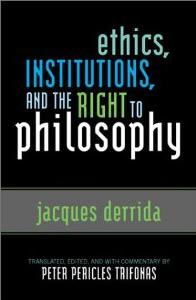Contents
The first chapter is the lecture The Right to Philosophy from the Cosmopolitical Point of View, held in 1991 by French philosopher Jacques Derrida at UNESCO. [1] The second chapter of the book is a roundtable discussion in which Derrida responded to other philosophers' questions about the lecture of first chapter; participants at the roundtable were Hazard Adams, Ernst Behler, Hendrick Birus, Wolfgang Iser, Murray Krieger, J. Hillis Miller, K. Ludwig Pfeiffer, Bill Readings, Ching-hsien Wang, and Pauline Yu; the roundtable was held in 1994 and published by journal Surfaces . [2]
This page is based on this
Wikipedia article Text is available under the
CC BY-SA 4.0 license; additional terms may apply.
Images, videos and audio are available under their respective licenses.
